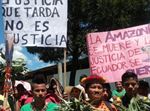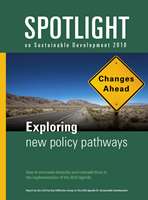Published on Tue, 2018-10-02 16:30
Introduction: the rise of corporate malpractice |
Published on Mon, 2018-10-01 08:42
Civil society organizations from Ecuador have brought to the attention of human rights bodies several cases of conflict between extractive industries and indigenous communities. In August 2017, the UN Committee on the Elimination of Racial Discrimination was urged to investigate the situation of several families from the Shuar community displaced unlawfully by the copper mining project San Carlos Panantza in the Amazon region. Four Amazonian provinces (Napo, Orellana, Pastaza and Morona Santiago) are affected by oil explorations over a total surface of four million hectares. The Center on Economic and Social Rights (CESR) is concerned that the consultation process with hundreds of indigenous communities in that huge area has not been conducted properly. |
Published on Mon, 2018-10-01 08:38
In 2015, with the adoption of the 2030 Agenda for Sustainable Development and the Sustainable Development Goals (SDGs), governments acknowledged the mutually enforcing power of peace and development. The 2030 Agenda represents a paradigm shift in terms of universality and interlinked goals, including across borders and affirms the need for a rights-based approach to peace and security, one focused on prevention. At the same time, most governments are still producing, trading and spending more on arms, thereby fueling a militarized approach to peace and security. Dominant power talks on how to achieve peace continue to silence those impacted most by conflicts and wars, including women and children. Profits made under war economies and through the arms trade continue to deepen inequalities and violate the rights of those with enormous humanitarian and development needs. |
Published on Mon, 2018-10-01 06:49
In the Czech Republic the most pressing social issue is the degree of household debt and the frequency of debt-related property seizures, which affects more than 8 percent of the population. Aggressive by private collection agencies, initiating actions for often minor sums have deprived hundreds of thousands of people of their property and often forced them to the edge of the society or even into homelessness. Nevertheless, Ondřej Lánský and Tomáš Tožička report on behalf of Social Watch-Czech Republic that “the conservative and liberal political right that dominates the public discourse keeps repeating that we are living in the best of times and that everybody’s well-off. It therefore forgets a large part of the society that lost in the transformation towards a market economy. They lost in the sense of lacking economic securities that used to be in place, and as a result of direct social degradation. But the major part of academia and the cultural elites refused to pay attention to social issues. Most of the churches and NGOs focused on providing paternalist assistance to the most vulnerable while keeping with the logic of individualistic responsibility. ‘New politicians’ coming from oligarchic circles are preying on such sentiments, promising more dignity to the low and middle classes, often outside of the urban centres.” |
Published on Sat, 2018-09-29 00:00
The “Islas encendidas” meeting that will take place in Malaga, Spain 19-20-21 October will be an incredible opportunity to share knowledge and learn how to work together to built a sustainable and just society. We will address citizenship and the distribution of power: the challenges we face for a democracy truly governed by its people. We will ask ourselves about those who are entitled to have rights and address inequalities, discourses, borders and different forms of violence. We will discover new forms of citizen participation and political culture, social oversight practices and new forms of power. We will inspire each other to forge a new social contract combining diversity, sustainability and justice, incorporating the feminist approach. |
SUSCRIBE TO OUR NEWSLETTER







